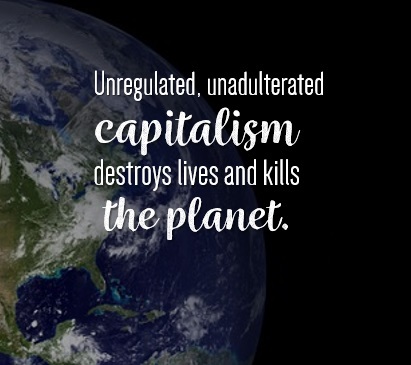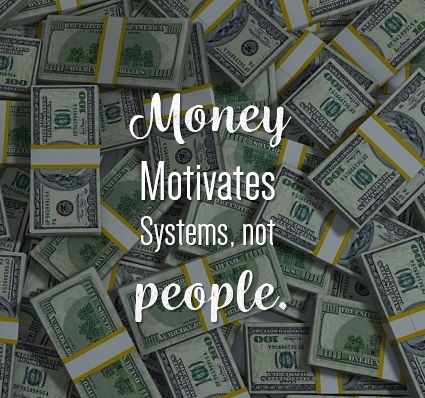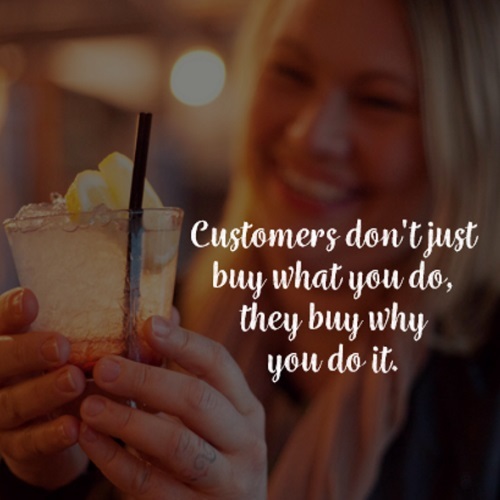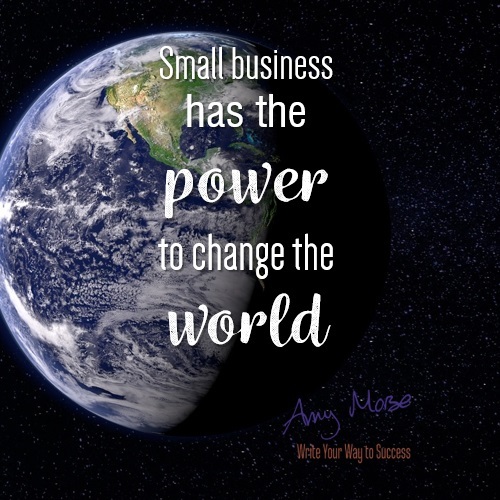Why Cheapest is Worrying: 3 Questions at the Core of Your Business
I saw a Tweet the other day; a business (who shall remain nameless) declared they were ‘the cheapest provider of their service in the market.’
It always bothers me when a business advertises they are the cheapest at X Y or Z.
Questioning the Cheapest
In most cases, this declaration of ‘the cheapest’ always sets alarm bells ringing for me. It raises all kinds of questions about how that is possible:
Are you exploiting your staff?
Are you cutting corners on quality?
Are you paying tax?
Are you using slave labour in another country?
Are you bullying your suppliers?
Are you using cheap raw materials sourced from countries that don’t uphold the same rigorous safety and consumer standards we’d expect?
Are you using outdated technology?
Have you invested in training your staff?
Have you tried to do it all yourself without paying for professional support?
Are you qualified?
Are you insured?
There must be something unethical and rotten at the core of your business if you’re that much cheaper than everyone else.
Why should I commit to working with you long term – surely, you’re making a loss at those prices and will disappear from the market any day now?
I wrote previously on the myth of cheapness.
The Example Set
I can understand why small businesses would employ these tactics to save money and get some cash coming in quick. Especially when you start out, you just want to break into the market and you’ll say yes to everything – until you settle in and mature as a business (which usually takes a couple of years!).
Small businesses also see these tactics being employed successfully by big retailers, and we’re lulled into this false sense that it’s how business is done. For example, we know they often have ‘loss leaders’; products that will make a loss but will entice you inside where you’ll fill a basket.
Exploitation, poor working conditions and lack of training for staff is well known, as is the use of cheap labour overseas (especially in the fashion industry). However, ‘out of sight out of mind’ is a powerful motivator when you can save a few quid on your weekly shop!
Set a new example
My first question is this:
1) What example will you set with your business?
I’m going to get all worthy and vaguely political here for a moment, but bear with me, I won’t go all woo-woo on you, I promise – it’ll be worth it…
Unregulated, unadulterated capitalism destroys lives and kills the planet.
On the face of it, the concept of capitalism in itself makes sense; if we can measure value we can systemise it and increase it, we can grow continually. And the logical measure of value is money. If everything can be given a monetary value, everything can therefore be measured and optimised.
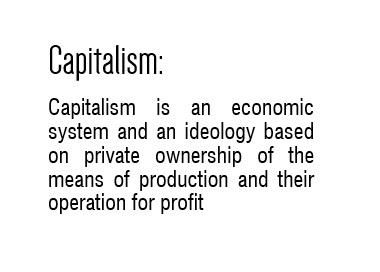
Definition source: Wikipedia
Makes sense, if your only measure of value is a financial one; if ‘profit’ is merely the acquisition of money.
So, here’s my next question:
2) Did you go into business simply to make money, or was there more to it?
I’m NOT saying, ‘money is bad’ or ‘capitalism is bad’ – I’m saying there are many more values than simply financial ones. The difference is, they’re harder to measure, therefore harder to systemise and therefore often ignored by ‘the business itself’ which is just there to make money. But it’s fair to say, that for the majority of people, our main motivator is not simply money.
Money motivates systems, not people.
Even top bosses in multi-million-dollar companies are not just there for the money. They will have their own personal motivators – usually associated with the things they can do with the money rather than the money itself – or the sense of achievement they derive from being in a position of power and influence.
The problem with capitalism as an ‘ideology’ is that anything that doesn’t have a measurable financial value is dismissed as unimportant, inconvenient or a net ‘cost’ for the business.
It removes the human from the equation; because human behaviour doesn’t fit the financial template the system relies on.
That’s why I say, ‘unregulated and unadulterated capitalism destroys lives and kills the planet’, because without checks and balances in place, money becomes the only thing of importance – which is inherently destructive, because it mercilessly consumes people and resources and converts them into cash.
But here’s the thing…
Business, systems, they are all started and run by humans. Capitalism reduces the role of the human to that of a ‘cost’ which is therefore recorded as a negative on its balance sheet.
But what if you measured and considered the human? What’s the social capital in the system? What if the value wasn’t simply a measurable financial one, but an emotional, ethical or social one?
Curious then, that when we talk about our ‘values’ we’re not talking about how much money we have in the bank!
3) What are your ‘values’ as a business?
When customers pay for value – they don’t just pay for the financial value that the business system measures, they pay for the ‘values’ (it’s plural) they associate with your business.
We don’t just buy what you do, we buy why you do it.
By actively seeking to be ‘the cheapest’ the signal we send out is that our only values are financial ones. That the business values little else. The business does not value the humans that run it.
As a consumer, do you want to buy into that? I certainly don’t!
In short, small business truly does have the power to change the world; because today’s small businesses are tomorrow’s big employers.
Today’s small businesses are the foundation of our future, and our future depends on more than just money. It depends on the values we create today.
We can have a form of ‘social capitalism’ (not socialism!).
‘Social Capitalism‘ finds profit in the small, everyday things businesses do to create a better future.
It starts with you, in your business, valuing more than just financial gain.
Ask yourself these 3 questions:
1) What example will you set with your business?
2) Did you go into business simply to make money, or was there more to it?
3) What are your ‘values’ as a business?
This is why people buy from you. Trust in the ‘values’ of your business and the financial value will follow.
If we all did that, we really can change the world!
What are your values?
(Tell us in the comments)
They are at the heart of your business, they are integral to the story of your business.
Talk to me about telling your story in your own words. Set up a free call HERE.
For instant updates when I publish a new blog post, Follow me on Bloglovin’
For extra goodies and exclusive new information, join my mailing list HERE.
I only send a newsletter monthly so I won’t spam you, I promise!
Save
Save
Save
Save
Save
Save
Save
Save
Save
Save
Save
The post Why Cheapest is Worrying: 3 Questions at the Core of Your Business appeared first on Amy Morse - Authorpreneur.

